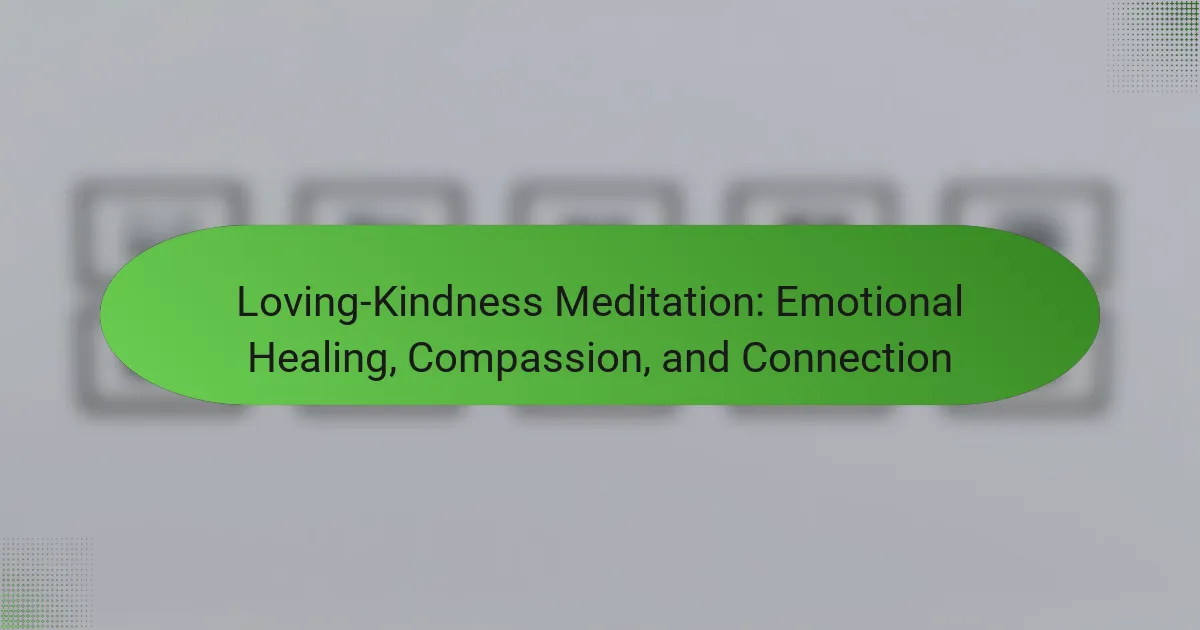Loving-Kindness Meditation (LKM) is a powerful practice that promotes emotional healing by nurturing compassion for oneself and others. By fostering positive feelings, LKM enhances mental well-being and strengthens connections, ultimately leading to improved relationships and emotional resilience. Engaging in this meditation technique can transform your mindset and cultivate a deeper sense of goodwill in your life.

How Can Loving-Kindness Meditation Heal Emotions?
Loving-Kindness Meditation (LKM) can significantly heal emotions by fostering compassion towards oneself and others. This practice encourages positive feelings, which can lead to emotional healing and improved mental well-being.
Reduces anxiety and depression
Loving-Kindness Meditation has been shown to lower symptoms of anxiety and depression by promoting positive emotions. Regular practice can help shift focus away from negative thoughts, allowing individuals to cultivate a sense of peace and calm.
Engaging in LKM for just a few minutes daily can create a noticeable difference in mood. Many practitioners report feeling less overwhelmed and more capable of handling stressors after consistent meditation sessions.
Enhances emotional resilience
This meditation technique enhances emotional resilience by encouraging individuals to respond to challenges with compassion rather than fear or anger. By practicing LKM, people can develop a more balanced emotional state, which helps them cope better with life’s ups and downs.
Building emotional resilience through LKM involves regularly visualizing positive intentions towards oneself and others. This practice can create a buffer against emotional distress, making it easier to navigate difficult situations.
Promotes self-acceptance
Loving-Kindness Meditation fosters self-acceptance by encouraging individuals to treat themselves with kindness and compassion. This shift in mindset can lead to improved self-esteem and a more positive self-image.
To promote self-acceptance, practitioners can focus on phrases like “May I be happy” or “May I be healthy” during meditation. Over time, this practice can help individuals embrace their imperfections and cultivate a more forgiving attitude towards themselves.

What Are the Benefits of Practicing Loving-Kindness Meditation?
Practicing loving-kindness meditation offers numerous emotional and psychological benefits, enhancing compassion, improving relationships, and boosting overall well-being. This meditation technique fosters a positive mindset and emotional resilience, making it easier to connect with oneself and others.
Increases compassion towards others
Loving-kindness meditation encourages practitioners to cultivate feelings of love and compassion for themselves and others. By focusing on positive affirmations and wishing well for others, individuals often find their capacity for empathy grows, leading to a more compassionate outlook on life.
This practice can be particularly beneficial in reducing negative emotions such as anger or resentment. Regularly engaging in loving-kindness meditation may help individuals develop a more forgiving attitude, enhancing their ability to connect with others on a deeper level.
Improves interpersonal relationships
As compassion increases, interpersonal relationships tend to improve. Loving-kindness meditation helps individuals communicate more openly and effectively, fostering a sense of trust and understanding. This can lead to stronger bonds with family, friends, and colleagues.
Practitioners often report feeling more connected to others, which can reduce feelings of loneliness and isolation. By nurturing positive feelings towards others, individuals may find it easier to resolve conflicts and build healthier relationships.
Boosts overall well-being
The emotional benefits of loving-kindness meditation extend to overall well-being. Regular practice can lead to reduced stress and anxiety, promoting a more balanced emotional state. This can enhance one’s quality of life and contribute to better mental health.
Additionally, studies suggest that loving-kindness meditation may improve physical health by lowering blood pressure and reducing symptoms of chronic pain. Incorporating this practice into daily routines can be a simple yet effective way to enhance both mental and physical wellness.

How to Start Loving-Kindness Meditation?
Starting loving-kindness meditation involves cultivating feelings of compassion and goodwill towards yourself and others. This practice can be initiated easily by following a few simple steps that help create a conducive environment and mindset.
Find a quiet space
Choosing a quiet space is essential for effective loving-kindness meditation. Look for a location where you won’t be disturbed, such as a peaceful room in your home or a serene outdoor setting. The goal is to minimize distractions to help you focus on your practice.
Consider using cushions or a comfortable chair to enhance your physical comfort. A calm environment can significantly improve your ability to connect with your feelings and intentions during meditation.
Set a specific time
Setting a specific time for your loving-kindness meditation can help establish a routine. Aim for a duration of around 10 to 20 minutes, especially if you are just starting. Consistency is key, so try to meditate at the same time each day, whether in the morning or evening.
Using a timer can help you stay focused without worrying about the clock. As you become more comfortable with the practice, you can gradually increase the duration to deepen your experience.
Use guided meditation resources
Guided meditation resources can be incredibly helpful for beginners. There are numerous apps and online platforms that offer loving-kindness meditation sessions led by experienced instructors. These resources often provide structured guidance, making it easier to follow along.
Look for options that resonate with you, whether they are audio recordings, videos, or live sessions. Many platforms offer free trials, allowing you to explore different styles and find what works best for your practice.

What Techniques Enhance Loving-Kindness Meditation?
Several techniques can enhance the practice of loving-kindness meditation, fostering deeper emotional healing and connection. These methods include visualization practices, breath awareness, and affirmation repetition, each contributing uniquely to the overall experience.
Visualization practices
Visualization practices involve creating mental images that evoke feelings of love and compassion. For example, you might picture a loved one smiling or imagine sending warmth and kindness to someone in need. This technique helps to cultivate positive emotions and deepen your connection to others.
To effectively use visualization, find a quiet space and close your eyes. Begin by taking a few deep breaths, then visualize a glowing light surrounding you, expanding outward to include others. This can enhance feelings of empathy and compassion.
Breath awareness
Breath awareness focuses on the natural rhythm of your breathing to anchor your mind during meditation. By paying attention to each inhale and exhale, you can create a sense of calm and presence, which is essential for cultivating loving-kindness.
Try to maintain a steady, gentle breath throughout your practice. If your mind wanders, gently bring your focus back to your breath. This technique can help ground your emotions and enhance your ability to connect with feelings of compassion.
Affirmation repetition
Affirmation repetition involves reciting positive phrases that reinforce feelings of love and kindness towards yourself and others. Common affirmations include “May I be happy,” “May I be healthy,” or “May I be at peace.” These phrases help to internalize compassionate thoughts and foster emotional healing.
Choose a few affirmations that resonate with you and repeat them silently or aloud during your meditation. Aim for a comfortable pace, allowing the words to sink in. This practice can significantly enhance your emotional resilience and connection to others.

How Does Loving-Kindness Meditation Foster Connection?
Loving-kindness meditation fosters connection by promoting feelings of compassion and goodwill towards oneself and others. This practice encourages individuals to cultivate positive emotions, which can strengthen relationships and enhance community ties.
Strengthens community bonds
Loving-kindness meditation helps individuals develop a sense of belonging and connection within their communities. By focusing on sending love and goodwill to others, practitioners often feel more engaged and invested in their relationships, leading to stronger social networks.
Regular practice can create a ripple effect, where the positive emotions experienced by one person can influence those around them. This can lead to increased participation in community activities and a greater willingness to support one another.
Encourages empathy
This meditation technique enhances empathy by encouraging practitioners to consider the feelings and experiences of others. By actively wishing for the happiness and well-being of others, individuals can better understand and relate to their struggles and joys.
Empathy cultivated through loving-kindness meditation can improve communication and reduce conflict in relationships. This practice can be particularly beneficial in diverse communities, where understanding different perspectives is crucial for harmony.
Facilitates social support
Loving-kindness meditation can increase the likelihood of providing and receiving social support. As individuals develop a compassionate mindset, they become more inclined to offer help to others and seek assistance when needed.
Creating a supportive environment can be as simple as sharing positive intentions with friends and family. Regularly practicing loving-kindness can lead to stronger, more resilient relationships that can weather challenges together.

What Are Common Misconceptions About Loving-Kindness Meditation?
Loving-kindness meditation is often misunderstood, leading to various misconceptions about its purpose and practice. Many people believe it is solely about feeling good or that it requires a specific religious background, which is not the case.
Loving-Kindness Meditation Is Only for Relaxation
While relaxation is a benefit of loving-kindness meditation, its primary focus is on cultivating compassion and emotional healing. This practice encourages individuals to develop a sense of connection with themselves and others, fostering empathy rather than just relaxation.
Participants often find that the emotional benefits extend beyond the meditation session, improving their overall relationships and emotional resilience. The practice can lead to a more compassionate outlook, which is beneficial in everyday interactions.
You Need to Be Experienced to Practice It
Another common misconception is that only experienced meditators can engage in loving-kindness meditation. In reality, this practice is accessible to everyone, regardless of their meditation background. Beginners can start with simple phrases and gradually build their practice.
Starting with just a few minutes each day can be effective. As individuals become more comfortable, they can increase the duration and depth of their practice. Resources like guided meditations can also help newcomers feel more at ease.
Loving-Kindness Meditation Is a Quick Fix for Emotional Issues
Some believe that loving-kindness meditation will instantly resolve emotional challenges. However, it is a gradual process that requires consistent practice to see significant changes in emotional well-being. The benefits accumulate over time, enhancing emotional healing and compassion.
Setting realistic expectations is crucial. Practitioners should view it as a long-term commitment rather than a quick solution. Regular practice, even for short periods, can lead to meaningful improvements in emotional health and interpersonal connections.
It Requires a Specific Religious Belief
Many people think that loving-kindness meditation is tied to Buddhism or other specific religions. However, it can be practiced by anyone, regardless of their spiritual beliefs. The core principles of compassion and kindness are universal and can be integrated into various lifestyles.
Individuals can adapt the practice to fit their personal beliefs, making it a versatile tool for emotional growth. This inclusivity allows a broader audience to benefit from its teachings, promoting a more compassionate society overall.



